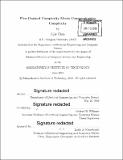Fine-grained complexity meets communication complexity
Author(s)
Chen, Lijie(Electrical and computer science engineer)Massachusetts Institute of Technology.
Download1124855984-MIT.pdf (12.63Mb)
Other Contributors
Massachusetts Institute of Technology. Department of Electrical Engineering and Computer Science.
Advisor
Richard R. Williams.
Terms of use
Metadata
Show full item recordAbstract
Fine-grained complexity aims to understand the exact exponent of the running time of fundamental problems in P. Basing on several important conjectures such as Strong Exponential Time Hypothesis (SETH), All-Pair Shortest Path Conjecture, and the 3-Sum Conjecture, tight conditional lower bounds are proved for numerous exact problems from all fields of computer science, showing that many text-book algorithms are in fact optimal. For many natural problems, a fast approximation algorithm would be as important as fast exact algorithms. So it would be interesting to show hardness for approximation algorithms as well. But we had few techniques to prove tight hardness for approximation problems in P--In particular, the celebrated PCP Theorem, which proves similar approximation hardness in the world of NP-completeness, is not fine-grained enough to yield interesting conditional lower bounds for approximation problems in P. In 2017, a breakthrough work of Abboud, Rubinstein and Williams [12] established a framework called "Distributed PCP", and applied that to show conditional hardness (under SETH) for several fundamental approximation problems in P. The most interesting aspect of their work is a connection between fine-grained complexity and communication complexity, which shows Merlin-Arther communication protocols can be utilized to give fine-grained reductions between exact and approximation problems. In this thesis, we further explore the connection between fine-grained complexity and communication complexity. More specifically, we have two sets of results. In the first set of results, we consider communication protocols other than Merlin-Arther protocols in [12] and show that they can be used to construct other fine-grained reductions between problems. [sigma]₂ Protocols and An Equivalence Class for Orthogonal Vectors (OV). First, we observe that efficient [sigma]₂[superscripts cc] protocols for a function imply fine-grained reductions from a certain related problem to OV. Together with other techniques including locality-sensitive hashing, we establish an equivalence class for OV with O(log n) dimensions, including Max-IP/Min-IP, approximate Max-IP/Min-IP, and approximate bichromatic closest/further pair. · NP · UPP Protocols and Hardness for Computational Geometry Problems in 2⁰([superscript log*n]) Dimensions. Second, we consider NP · UPP protocols which are the relaxation of Merlin-Arther protocols such that Alice and Bob only need to be convinced with probability > 1/2 instead of > 2/3. We observe that NP · UPP protocols are closely connected to Z-Max-IP problem in very small dimensions, and show that Z-Max-IP, l₂₋-Furthest Pair and Bichromatic l₂-Closest Pair in 2⁰[superscript (log* n)] dimensions requires n²⁻⁰[superscript (1)] time under SETH, by constructing an efficient NP - UPP protocol for the Set-Disjointness problem. This improves on the previous hardness result for these problems in w(log² log n) dimensions by Williams [172]. · IP Protocols and Hardness for Approximation Problems Under Stronger Conjectures. Third, building on the connection between IP[superscript cc] protocols and a certain alternating product problem observed by Abboud and Rubinstein [11] and the classical IP = PSPACE theorem [123, 155]. We show that several finegrained problems are hard under conjectures much stronger than SETH (e.g., the satisfiability of n⁰[superscript (1)]-depth circuits requires 2(¹⁻⁰[superscript (1)n] time). In the second set of results, we utilize communication protocols to construct new algorithms. · BQP[superscript cc] Protocols and Approximate Counting Algorithms. Our first connection is that a fast BQP[superscript cc] protocol for a function f implies a fast deterministic additive approximate counting algorithm for a related pair counting problem. Applying known BQP[superscript cc] protocols, we get fast deterministic additive approximate counting algorithms for Count-OV (#OV), Sparse Count-OV and Formula of SYM circuits. · AM[superscript cc]/PH[superscript cc] Protocols and Efficient SAT Algorithms. Our second connection is that a fast AM[superscript cc] (or PH[superscript cc]) protocol for a function f implies a faster-than-bruteforce algorithm for a related problem. In particular, we show that if the Longest Common Subsequence (LCS) problem admits a fast (computationally efficient) PH[superscript cc] protocol (polylog(n) complexity), then polynomial-size Formula-SAT admits a 2[superscript n-n][superscript 1-[delta]] time algorithm for any constant [delta] > 0, which is conjectured to be unlikely by a recent work of Abboud and Bringmann [6].
Description
Thesis: S.M., Massachusetts Institute of Technology, Department of Electrical Engineering and Computer Science, 2019 Cataloged from PDF version of thesis. Includes bibliographical references (pages 215-229).
Date issued
2019Department
Massachusetts Institute of Technology. Department of Electrical Engineering and Computer SciencePublisher
Massachusetts Institute of Technology
Keywords
Electrical Engineering and Computer Science.